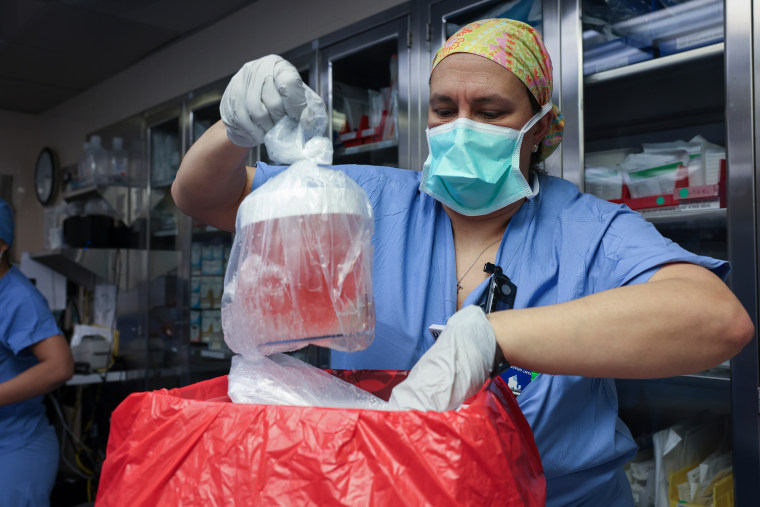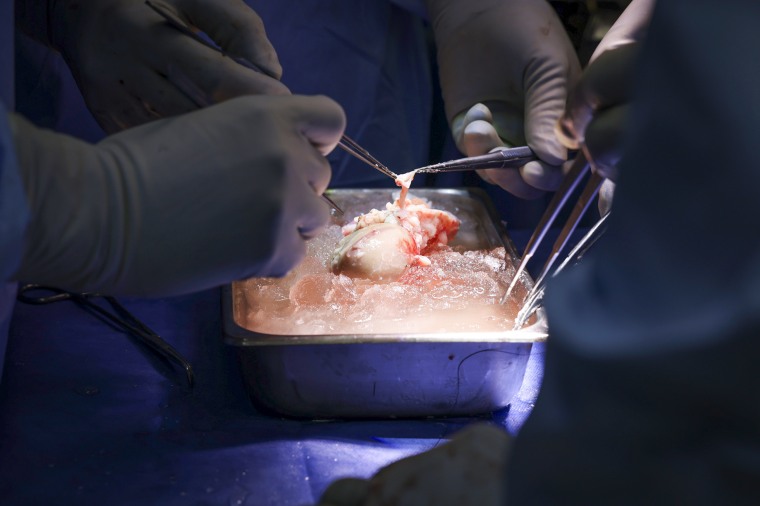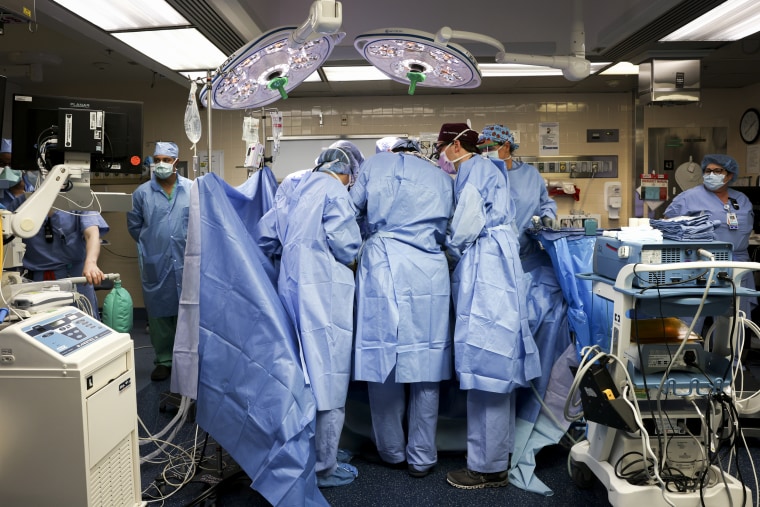- The recipient, a 62-year-old man, is recovering from the operation, and doctors said they expect to send him home as soon as this weekend
Last Saturday, Richard Slayman made history: He became the first living person to receive a genetically modified kidney from a pig, surgeons at Massachusetts General Hospital in Boston said Thursday.
Slayman, 62, whose kidneys had failed and who had been on dialysis, underwent the four-hour operation Saturday to receive the pig kidney, said his nephrologist, Dr. Winfred Williams, the associate chief of the nephrology division at Mass General.
“It really is a groundbreaking milestone,” William said. “Should the kidney continue to work well and this is a success, I think it represents a breakthrough in a number of different areas.”
The first successful pig kidney transplant in a living recipient — a milestone in the field of so-called xenotransplantation, or animal-to-human transplant — could offer hope to the tens of thousands of people in the U.S. on the waiting list for organ transplants, as well as countless others worldwide.
More than 100,000 people in the U.S. are on transplant waiting lists, including about 90,000 who need kidneys, according to the United Network for Organ Sharing, a nonprofit group that manages the U.S. organ transplant system.
But xenotransplantation still comes with significant risks. There have beentwo pig-to-human heart transplants in the U.S.; in both cases, the patients lived for no more than two months.
Slayman’s operation was five days ago. He’s still recovering at Mass General, but Williams said his doctors hope to send him home this weekend, as long as no complications come up.
So far, there have been no signs that his body’s immune system is rejecting the kidney, Williams said.

“His blood pressure, his vital signs are very stable,” he said. “He looks almost completely on the way to full recovery.”
Still, doctors are collecting samples of Slayman’s blood around the clock, looking for signs of a dangerous virus, which is believed to have killed the man who received the first genetically modified heart from a pig in 2022.
The question of how long the kidney will last remains.
“It will be really interesting to learn whether or not the xenograft is ultimately a bridge, meaning it lasts for a short period of time until a human allograft can be found, or if it’s going to be what we call destination, meaning it will last this individual the rest of his life,” said Dr. Jayme Locke, a transplant surgeon at the University of Alabama Birmingham Heersink School of Medicine.
Even so, “it’s game-changing,” Locke said.
A one-off, for now
Xenotransplantation isn’t approved by the Food and Drug Administration. Though it’s been touted as a potential solution to the worldwide organ shortage, it could be years before the procedure is widely used, as much more data is needed.
“What we really want to do is get to the initial clinical trials, where you have multiple patients that are receiving xenografts and several centers that are participating where you can really test a hypothesis and see how safe this is and how well it works,” said Dr. Robert Montgomery, the director of the NYU Langone Transplant Institute.

Slayman’s transplant was performed under the FDA’s compassionate use program, which lets patients with serious, life-threatening conditions access experimental treatments when nothing else is available.
“It’s a one-off transplant,” said Karen Maschke, a researcher at the Hastings Center, a bioethics research institute, who studies the ethical, regulatory and policy issues involving the use of new biomedical technologies.
While Slayman was unique in that he was chosen for a pig kidney transplant, his condition was far from rare: About 800,000 people in the U.S. have kidney failure and require dialysis, often a time-consuming process for patients.
Slayman had previously received a kidney transplant from a deceased human donor in 2018 after having been on dialysis for seven years. The transplant, however, showed signs of failure last year, and he resumed dialysis.
Williams said putting Slayman back on the waiting list for a new kidney was an option, although that would have entailed a wait of six to seven years, a time frame Williams doubted Slayman would have survived.
“He was in dire straits,” Williams said.
So Dr. Leonardo Riella, the medical director of kidney transplantation at Mass General, proposed another option: a pig kidney transplant, which, Williams said, Slayman agreed to, adding that he was frustrated with dialysis.
“Our hope is that dialysis will become obsolete,” Riella said at a press conference Thursday.

The hospital got the genetically modified kidney from the Cambridge, Massachusetts-based drugmaker eGenesis, Riella said.
The kidney contained a total of 69 gene edits, he said, 10 of which were made to reduce the risk of rejection. The 59 other edits were made to lower the risk of infection from viruses.
The pig kidney was roughly the same size as a human kidney, and “when you look at it microscopically, looks exactly like a human kidney,” Riella said. “But based on the divergence 80 million years ago between humans and pigs that are different, the genetic edits that have been made allow us to have a much more compatible kidney.”
Dr. Tatsuo Kawai, the surgeon who performed the operation, said the operating room erupted in applause when people realized the transplant was successful.
“Right after the restoration of the blood flow to the kidney, the kidney pinked up immediately and started to make urine,” Kawai said. “It was the most beautiful kidney I had ever seen.”
@NBC News





